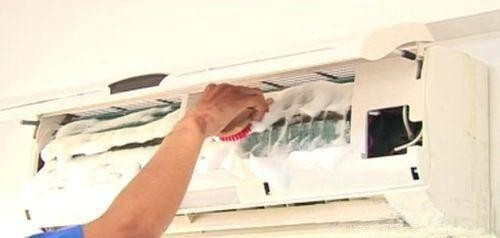空調(diào)怎么會(huì)自動(dòng)關(guān)機(jī)(空調(diào)為何自動(dòng)關(guān)機(jī))
Summary: This article aims to explore the reasons why air conditioners automatically turn off. The discussion is pided into four main aspects: temperature control, energy efficiency, system protection, and user convenience. Each aspect is discussed in detail to provide a comprehensive understanding of the topic. The article concludes by summarizing the importance of these automatic functions in air conditioners.

One of the primary reasons for an air conditioner to automatically turn off is temperature control. Air conditioners are designed to cool down the room to a certain temperature and maintain it at that level. When the desired temperature is reached, the air conditioner switches off to avoid overcooling the room. This process helps to create a comfortable indoor environment and prevents energy wastage. Additionally, the system may also turn off when the desired temperature is not achieved due to a malfunction or improper installation.

In some cases, air conditioners have a built-in thermostat that senses the ambient temperature. When the thermostat detects that the room has reached the desired temperature, it signals the air conditioner to turn off. This automatic temperature control feature ensures energy efficiency and prevents excessive cooling.

Energy efficiency is another significant aspect that leads to the automatic shutdown of air conditioners. By turning off when the set temperature is reached, air conditioners prevent excessive energy consumption, resulting in lower electricity bills. This feature is particularly important in countries with high energy costs and limited resources. It also promotes environmental sustainability by reducing carbon emissions associated with energy generation.

Some modern air conditioners are equipped with advanced sensors and technology that monitor various factors such as occupancy, sunlight, and humidity. Based on these inputs, the system intelligently adjusts the cooling load and may even turn off selectively in unoccupied areas. This energy-saving function not only reduces electricity consumption but also extends the lifespan of the air conditioner by reducing wear and tear.

Air conditioners have automatic shutdown mechanisms to protect the system from damage. Overheating is a common problem in air conditioning units due to continuous operation, high ambient temperatures, or clogged filters. To prevent permanent damage, air conditioners automatically shut down when the internal temperature exceeds a safe limit, allowing the system to cool down and avoid potential failures.

Similarly, some air conditioners have a self-diagnostic function that detects faults or abnormalities in the system. When an issue is identified, the system automatically shuts down to avoid further damage and provides error codes that help in troubleshooting and repair. These protective features not only increase the longevity of the air conditioner but also reduce the risk of accidents or breakdowns.

Lastly, the automatic shutdown of air conditioners offers convenience to users. Many modern air conditioners are equipped with programmable timers that allow users to set specific on and off times. This feature enables users to pre-cool a room before returning home or have the air conditioner shut off after a certain period of time, ensuring energy efficiency and eliminating the need to manually turn off the unit. Additionally, some air conditioners have sleep mode functions that automatically adjust the temperature and fan speed during the night, providing a comfortable sleep environment.

Moreover, the automatic shutdown of air conditioners during periods of inactivity or low demand helps reduce noise levels and allows for peaceful surroundings. This feature is especially beneficial in bedrooms, study rooms, or offices where silence is desired for concentration or relaxation.
In conclusion, air conditioners automatically turn off for several reasons, including temperature control, energy efficiency, system protection, and user convenience. The automatic shutdown ensures that the desired temperature is achieved without excessive cooling, leading to energy conservation and cost savings. It also protects the system from damage caused by overheating or faults. Furthermore, these automatic functions provide convenience to users by allowing them to customize cooling schedules and create a comfortable environment. Understanding the reasons behind automatic shutdowns in air conditioners is essential for efficient and effective use of this appliance.
- 冰箱銅管腐蝕(如何預(yù)防和處理)05-06
- 酒柜可以放客廳嗎(如何選擇合適的位置)?08-29
- 1天然氣表顯示故障代碼(如何解讀和修復(fù))。
- 2熱水器放空水步驟圖(詳細(xì)圖解,讓你輕松操作)。
- 3電機(jī)能轉(zhuǎn)但沒(méi)勁(可能的原因和解決方法)。
- 4daogrs燃?xì)庠罘?wù)電話(huà)(daogrs燃?xì)庠罘?wù)電話(huà):貼心服務(wù)一鍵呼叫)
- 5警建指紋鎖維修服務(wù)電話(huà)(警建指紋鎖維修服務(wù)電話(huà)——專(zhuān)業(yè)安全指紋鎖維修)
- 6制冰機(jī)故障代碼(常見(jiàn)故障代碼解析)。
- 7蘭柏璐保險(xiǎn)柜售后服務(wù)中心(蘭柏璐售后服務(wù)中心)
- 8海爾滾筒洗衣機(jī)故障代碼大全(如何快速解決故障)
- 9艾木歐防盜門(mén)廠家電話(huà)(艾木歐防盜門(mén)廠家電話(huà)大全)
- 10美的空調(diào)清洗代碼(美的空調(diào)清洗代碼,完美保證室內(nèi)空氣質(zhì)量)
-
櫻雪點(diǎn)火故障(解決櫻雪點(diǎn)火故障的實(shí)用方法與步驟)
2024-08-24


